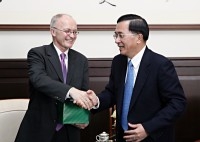News & activities
 News releases
News releases

President Chen Shui-bian on April 20 met with 2004 Nobel Economics Prize Winner Dr. Finn E. Kydland and expressed his welcome and appreciation to the Nobel Laureate on behalf of the ROC (Taiwan) government and people. Dr. Kydland is in Taiwan to deliver a speech at the invitation of the Economic Daily News and the Chung-Hua Institution for Economic Research.
President Chen noted Dr. Kydland's pre-eminent position in the field of macro-economics. He said that many people on Taiwan involved or interested in the field of macro-economics are excited to have the opportunity to listen to the incisive speech that Dr. Kydland will deliver.
The president said that the rise of the Chinese economy and the magnet effect of the China market have dealt a blow to a number of countries, including the United States and Japan, as well as European nations. He said that given Taiwan's close proximity to China as well as a shared language and culture, Taiwan naturally has been impacted the most by China's economic strength. Many Taiwan industries have left the island and have moved to the mainland. As a result, the amount of investment on Taiwan has dropped, impacting employment opportunities and economic growth here, as well as causing salaries to stagnate. He added that everyone believes that the rapid economic growth of Asia's four little tigers in the past was primarily due to universal education and a balanced distribution of wealth. The staggering economic growth in mainland China, however, has caused increasing imbalances between rural and urban areas. The president asked Dr. Kydland to express his views on whether this situation will impact China's economic growth in the future.
Dr. Kydland said that China must face an increasingly wide wealth gap and needs to undertake policy adjustments to address the issue. He said he hopes that when China lays down new policies, they will not have a negative impact on China's economic growth. Generally speaking, however, he said he believes the plight of the poor in China today has improved to a degree in comparison with the period before economic reforms were introduced in China. Therefore, China's economic growth is benefiting that nation as a whole.
Dr. Kydland also said that while Taiwan has been impacted on many fronts due to China's economic rise, he believes that Taiwan should not be overly concerned about various short-term issues. He said that as long as Taiwan encourages innovation, sets forth policies that encourage investment and institutes industrial upgrading, the Taiwan economy will continue to grow. He also expressed his feeling that the short-term setbacks Taiwan is now facing are only temporary and that the island's economy will re-gain strength in the future to levels where it posts high levels of growth. Dr. Kydland said that after a country's economy reaches maturity, it is natural for growth rates to slow. He said that Taiwan's economy development has yet to reach the mature stage and therefore anticipates that the local economy has room to continue to grow.


